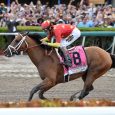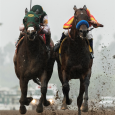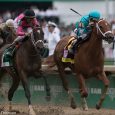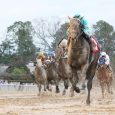During the springtime, Kentucky Derby (GI) fever is a real affliction. Ask anyone involved in racing. The connections of a handful of horses do their respective Derby points dances, say prayers to the Twin Spires Gods and perform all kinds of other odd behaviors, all in hopes of earning one of the 20 spots in the Derby starting gate.
This year, the connections of graded stakes-placed Cloud Computing successfully shook the virus symptoms that affect so many and skipped the Run for the Roses despite having earned enough points in favor of the Preakness Stakes (GI), giving more time between races to the lightly raced colt and avoiding the pitfalls that sometimes come with the bumper car affair the Kentucky Derby sometimes becomes.
And on Saturday, as if it were some supernatural reward for all of their patience and the desire to do the right thing for their horse, Cloud Computing posted a mild upset and captured Saturday’s 142nd running of the Preakness after an impressive stalking trip under Javier Castellano, running down champion Classic Empire in deep stretch to prevail by a head in the second jewel of racing’s Triple Crown.
“No regrets,” co-owner Seth Klaraman said when asked about skipping the Kentucky Derby. “I think possibly some of the reason that we won today was because we were patient and didn’t throw an inexperienced horse against a 20-horse field in the Derby on a very difficult track.
“So, I think that’s actually why we’re here today. I’ve also learned in life that you don’t look back with a lot of would-have, could-have, should-have, that we made a great call and we’re ecstatic today and we’ll worry about the future, not the past.”

Cloud Computing storms past Classic Empire late to win the Preakness Stakes (photo via Jim McCue, Marlyland Jockey Club).
Cloud Computing, who is trained by Eclipse Award winner Chad Brown, left the gate at odds of more than 13-1 and paid $28.80, $8.60 and $6. At odds of just more than 2-1, Classic Empire was good for $4.40 and $4. Late running Senior Investment crossed the wire another 4 ¾ lengths behind the runner-up and returned $10.20 as the 31-1 second-longest shot on the board. The $2 exacta was good for $98.40 and the trifecta was worth $2,194.60.
Lookin at Lee, Gunnevera, Multiplier, Conquest Mo Money, Kentucky Derby winner Always Dreaming, Hence and Term of Art completed the order of finish.
From the break, Cloud Computing received a dream trip under Castellano, racing tucked in along the rail and in third behind the dueling duo of Classic Empire and Always Dreaming, who sped through the first three-quarters of a mile in splits of :23.16, :46.81 and 1:11. As Classic Empire took over the lead on the outside of a visibly tiring Always Dreaming on the far turn, Castellano asked Cloud Computing for his best run and, after bumping lightly with Always Dreaming at the top of the stretch, only had Classic Empire between himself and his name in the Preakness history books with just less than a quarter-mile left to run.
Under a vigorous hand ride from Castellano, Cloud Computing dug in down the lane, leaned in briefly with just more than a furlong to run and eventually grinded out the victory while racing closer to the middle of the track and after Classic Empire posted the one-mile split in 1:36.63, Cloud Computing stopped the Teletimer in 1:55.98 on a track labeled fast.
“I think I have a lot of confidence with the horse,” the winning rider said. “I never had the opportunity to ride the horse, you can see. But the way I saw it at races and the analysis, and Mr. Brown gave me the opportunity to ride the horse. I’m thankful for that, and it was a great combination. We have a good clip [together] in the past and the last couple of years we’ve been very successful; he gave me the opportunity to ride the horse in the Preakness, and I took it from there. And it worked out great. I think it was a great combination, and I’ve been blessed to have the opportunity. And I think we just enjoy the ride.”
Bloodstock agent Mike Ryan successfully bid to $200,000 for Cloud Computing on behalf of his current owners at the Keeneland September yearling sale in 2015. The son of Maclean’s Music is out of the graded stakes-placed A.P. Indy mare Quick Temper and was bred in Kentucky by the partnership of Hill ‘n’ Dale Farms and John Franks. Cloud Computing earned $900,000 for his first career grade 1 and his total earnings now stand at $1,071,000 with a career line of 4-2-1-1. He was also second in the Gotham Stakes (GIII) and third in the Wood Memorial Stakes (GII).
“We always liked this horse as a 2-year-old,” Brown said of his first classic winner. “He got injured up at Saratoga. He was one of our first 2-year-olds to run, actually. He showed a lot of talent right away. Ironically him and Practical Joke were identified as Seth and Bill’s horses two of the best in the crop. And Practical did well and this horse got hurt. So we rested him, and Seth and Bill have always been extremely patient with their horses, no rush and whatever is best for them we do.
“We knew he was good right away. How did we know he was this good, Preakness good? I’d say in his second start, in the Gotham, when he was kind of chasing a fast pace and then made another run in the lane, he just never quit. We huddled up and said this horse is really special and he can go that far. How do we get to the Derby? And it just didn’t work out in the Wood. We just ran out of time. Looking back on it, it was a bit of a speed buyer’s track that day, and he was one of the only horses that closed ground really. After that it really wasn’t a hard decision. We had the points and we got together and we just really zeroed in on this race, and thankfully it worked out.”
Brown said Cloud Computing will return to his Belmont Park base early Sunday morning and a decision on whether or not he makes the Belmont Stakes (GI) in three weeks will be made over the next few days.
Trainer Mark Casse, who believed his champion Classic Empire was the best in the Derby after enduring a very troubled, wide trip and emerging with an eye injury, was still very proud of his charge despite the loss.
“I thought he ran outstanding,” Casse said. “I always worry about him starting because he stumbles a little bit. He won the Breeders’ Cup Juvenile going out after [the lead] and I said to [jockey] Julien [Leparoux], ‘Second doesn’t mean anything.’ I said, ‘Let’s go and try to win this thing.’ It ended up getting us in the end. We were going to be in it, and he said, ‘OK.’ We were going to be aggressive and that’s what we did. I know [Classic Empire’s] mind tends to wander and I was a little worried about that. I was hoping that horse came to him earlier. He tried to kick back, but we were second best today.”
Trainer Todd Pletcher, who was visibly stunned after Always Dreaming beat just two rivals, offered no excuses for the defeat or future plans for his Derby winner. He didn’t think the early pace was too fast for the son of Bodemeister and the possibility it wasn’t the colt’s favorite surface wasn’t an issue.
“No [the pace wasn’t too fast],” Pletcher said. “Classic Empire held on for second. He probably went pretty ambitiously at us and maybe cost himself the race, but we didn’t have an excuse. We were in the position we expected to be and I think the turnaround was a little too quick. He ran so hard in the Derby and today just wasn’t his day.
“I was a little concerned coming by the wire the first time. He was there, but it wasn’t like he was dragging Johnny there, actually. It felt like he was on a loose rein by the time they turned up the backside. That’s kind of what we anticipated Classic Empire would do, take it to us, but he just didn’t have that reserve today.
“He didn’t seem to relish the track, but I don’t really think that was it. It was just that he put so much into the Derby that it wasn’t meant to be.
“Initially, it looks like he came back well. We’ll savor the Derby victory,” Pletcher concluded.
The Maryland Jockey Club revealed that Saturday’s Preakness Day card broke all handle and attendance records at Pimlico Race Course. On-track attendance for the day was 140,327, breaking last year’s record of 135,256, while the total handle on the 14-race program was $97,168,658, an increase of three percent over the previous record of $94,127,434 and a 14 percent increase over 2015 wagering. In-state handle was up 7.1 percent from last year and 10.4 percent from 2015.




